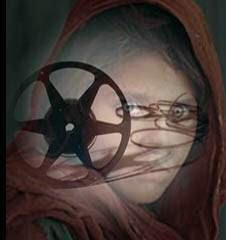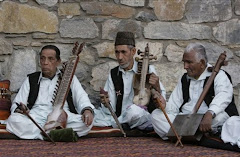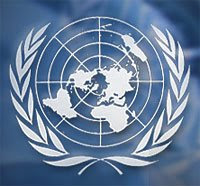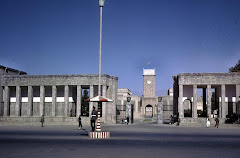
An emerging Hazara Author is to compete Khaled Husseini .... READ MORE on HAZARA PEOPLE and TURKIC PRESS


‘Once there was a time, when there was love but against it there was a reaction of hate, there was the hand of friendship but against it there was the gun of enmity. There were struggles of men versus the hands of fate on the waves of life. There were only good memories left in front of hard times with harsh truths. There was thirst for power but there was still trend for forgiveness. There was darkness of disappointment but on the other side there was still hope for the brightness of the dawn. There were wails while there was still laughter. There was war and there was peace. There were massacres and there were survivors.
But once the time changed and cruelty took over and fear began ruling on everyone’s heart. Love was replaced by hate. Nothing was seen but redness of blood, bloods of weak human beings shed by the fiercer ones of the same kind. It was then time when love, and humanity were both taken away by the wind of time, instead darkness was covering everyone’s eyes. The little boys became grown men in overnight to pick up guns and kill proudly mankind of the hostiles when hostility was expanding day by day and people went to slavery; in such a situation cruelty had no limits!
In the twilight time it was hard to distinguish cries of men from the howls of wolves. There was only thirst for blood and there was passion for revenge and it continued generation to generation until one man came to save his nation breaking the chains of slavery and tearing the ropes of Juwalis and again the sign of hope began to blink in the eyes of millions of people.’
It all happened in the era when being Hazara was a crime on a land today called
***
Finally these days I am sighing for having finished the first step of work; my novel is completed and is now the time to talk with a good publisher/distributor.
Completing a fiction work in a second language has never been easy for me, however nowadays after two long years of hard work I am more and more convinced to believe in success when there is faith, strong motivation, determination and self-confidence behind even a very difficult work.
I began writing the first lines of my novel in January 2008 since the basic idea was bred in my mind, but then I quit writing it for I was blogging, studying and working to afford my life expenses.
In early 2009 I found a job in a bookstore ‘as a librarian’ when I was attracted towards literature, and then in the same year while studying cinema and I could not fund my short films, it was when broken heart I was really determined first to complete my novel. Since then I tried to allocate the little spare time I had to write and wrote it bit by bit and then there was no more time for my blogs and it cost me my silence in blogging thereafter.
In spite of all its hardships with a second language when it is not one’s first one, I was familiar with English for about ten years; two years of studying, three years of teaching experience and more than three years of translation experience and writing several essays in English had all helped me advance my English level to be able to write a novel, of course it may not be the same level of a native English writer as I was not born and raised in an English speaking country, but still I did my best.
***
As the title of the novel is not finalized, neither the publisher is specified yet, I wouldn’t say much about the outline, rather I would only say what kind of book it is and why it is worth mentioning about it here and now in advance –before it is published.
First I should thank Khaled Husseini who with his “The Kite Runner” broke the long-time taboo of talking about prohibited issues, hidden truths and untold stories in Afghanistan that were for long considered as ‘against “the fake” fragile national unity’, and he opened the way for the other emerging authors on stories of such kind.
My novel completes what Khaled Husseini had not reached to, in his novel “The Kite Runner”.
“The Kite Runner” with all its success, had just touched roughly a part of the existing harsh realities in the country but not uncovered it fully and many questions remained unanswered while in mine one I crossed the red-line borders and depicted all those untouched issues for my readers; the hidden layers of the long Hazara- Pashtoon conflicts in Afghanistan based on the existing and historical realities.
In a short saying my novel is a more completed and a more- in-depth version of Khaled Husseini’s and the good point is that; it is written by a Hazara Author, a remainder of the historical mass massacre of the Hazaras in Afghanistan thus it has its originality! It is written in a first person protagonist and in English of course.
You will read how a mass massacre and slavery affected the lives of four generations of a minor ethnic ‘the Hazaras’ through passage of time in Afghanistan and how a man struggles first to survive and then stand to save his nation.
My work is a novel, a fiction work, partly inspired by the lives of real people but is built up and mixed with fantasy elements, imaginations and is nourished by the help of historical facts, evidences and existing realities in our society.
By reading my novel ‘that doesn’t have a definite title yet’, you will be traveling to the real Afghanistan through forty years of life of the protagonist, sixty years of lives of his forefathers and will be feeling yourself a part of it, a part of the history of humanity on a part of the globe which is on the top of headlines of media of the world again these days.’
With this novel, I let you see the world through Chinese-like little eyes of a Hazara.
The story begins in
It is to add that, this novel is a strong potential for adoption into a major motion picture.
***
If you follow my blogs and my Face Book postings, you will know about it more, the soon there will be accords on its publication and distribution dates.
If you have read ‘The Kite Runner’ and liked it, I should say, definitely reading this one is a must!
The USA,
In advance,
With love,
From the core of my heart,
I send my salutes
To all my readers!
M. Amin Wahidi

"C'era una volta un tempo in cui regnava l'amore ma contro di esso si scagliava l'odio, c'era amicizia ma contro di essa si alzavano le armi dell'inimicizia. C'erano uomini in lotta contro il destino trasportati dalle onde dell'esistenza. C'erano puri e buoni ricordi a scontrarsi con tempi difficili e verità crudeli. C'era sete di potere ma ancora si sceglieva di perdonare. C'era il buio del disinganno ma al contempo si sperava ancora in un' alba lucente. C'erano lamenti e risate, c'era la guerra e c'era la pace, c'erano massacri e sopravvissuti.
Ma un giorno tutto questo cambiò, la crudeltà prese il sopravvento e la paura si impossessò del cuore di ognuno. L'amore fu sostituito dall'odio. Non si vedeva che sangue, il sangue di essere umani che scorreva per mano di altri essere umani più feroci. Fu il momento in cui il vento del tempo spazzò via amore e umanità e un velo nero scese a coprire gli occhi di ognuno. I bambini divennero nel giro di una notte adulti capaci di brandire un'arma e uccidere con fierezza mentre l'ostilità cresceva di giorno in giorno e le persone erano ridotte in schiavitù; la crudeltà non aveva limite!
Al crepuscolo era difficile distinguere le urla degli uomini dagli ululati dei lupi. C'erano soltanto sete di potere e ansia di vendetta e questo andò avanti per generazioni, finché un uomo venne a salvare il suo paese spezzando le catene della schiavitù e strappando le corde di Juwalis; allora di nuovo un segno di speranza tornò a brillare negli occhi di milioni di persone."
Tutto successe all'epoca in cui essere un Hazara era considerato un crimine nella terra che oggi viene chiamata Afghanistan.
Io ho raccolto il tutto in un meraviglioso romanzo.
***
In questi giorni sto finalmente tirando sospiri di sollievo per aver completato una prima parte del mio lavoro: il mio romanzo è finito ed è venuto il momento di parlare con un buon editore.
Portare a termine un lavoro di fiction in una lingua che non è la mia non è stato facile. Tuttavia al momento attuale dopo due anni di duro lavoro sono sempre più convinto si poter credere al successo se c'è fede, forte motivazione, determinazione e fiducia in se stessi, anche dietro a una lavoro veramente difficile.
Ho cominciato a stendere le prime righe del mio romanzo nel gennaio del 2008 non appena l'idea di base si è formata nella mia testa, ma poi ho interrotto la scrittura perché dovevo curare il mio blog, studiare e lavorare per permettermi le spese di tutti i giorni.
All'inizio del 2009 ho trovato lavoro in una libreria "come libraio" visto che ero interessato alla letteratura. Nel corso dello stesso anno studiavo cinema e non potevo finanziare i miei corti. Divenni perciò determinato a portare a termine per prima cosa il mio romanzo. Da allora gli ho dedicato tutto il mio tempo libero scrivendolo pezzo dopo pezzo: in questo modo non ho più avuto tempo per i miei blog e sono stato costretto al silenzio in quel frangente.
Malgrado tutte le difficoltà di una seconda lingua, l'inglese mi è stato familiare per circa una decina d'anni: due anni di studio, tre anni di esperienza nell'insegnamento e più di tre anni a tradurre e scrivere numerosi saggi mi hanno aiutato ad innalzare il livello del mio inglese fino ad essere in grado di scrivere un romanzo. Naturalmente non sarà mai lo stesso livello di uno scrittore madrelingua, ma ho fatto del mio meglio.
***
Poiché il titolo del romanzo non c'è ancora e non si conosce l'editore, non farò una presentazione dettagliata ma vorrei piuttosto dire di che libro si tratta e perché vale la pena di parlarne d'ora in avanti, prima che esso sia pubblicato.
Per prima cosa devo ringraziare Khaled Husseini che con il suo "The kite runner" (tradotto in Italia "Il cacciatore di aquiloni", n.d.t.) ha rotto un tabù che per anni aveva impedito di parlare di argomenti proibiti, verità nascoste e storie non dette che in Afghanistan sono state a lungo considerate "nemiche della (finta) fragile unità nazionale". Egli ha spianato la strada ad altri autori emergenti con storie di tal genere.
Il mio romanzo completa "Il cacciatore di aquiloni" dicendo cose che Khaled Husseini non aveva detto.
"Il cacciatore di aquiloni", che ha avuto tanto successo, è arrivato a sfiorare le dure realtà del nostro paese senza però metterle a nudo completamente e lasciando molte questioni senza risposta. Con il mio romanzo invece io ho oltrepassato i confini della linea rossa tratteggiando per i miei lettori argomenti mai ancora descritti: gli strati nascosti del lungo conflitto Hazara-Pashtoon. Tutto si basa su realtà storiche esistenti.
Per dirla brevemente, il mio romanzo è una versione più completa e approfondita di quello di Husseini. Il punto a suo favore è questo: esso è scritto da un autore Hazara, un testimone diretto del massacro di massa degli Hazara in Afghanistan, ecco in cosa consiste la sua originalità! E' scritto da un protagonista in prima persona e naturalmente in inglese.
Leggerete di come un massacro di massa e le schiavitù hanno colpito le esistenze di quattro generazioni della minoranza etnica degli "Hazara" in Afghanistan e di come un uomo lotta per sopravvivere e in seguito si propone di salvare la propria nazione.
L'Afghanistan è tuttora una terra piena di contraddizioni dove si ritrovano immagini in contrasto tra loro. E' buona cosa fare la conoscenza approfondita di un paese attraverso un buon romanzo.
Il mio lavoro è un romanzo, una fiction in parte ispirata alla vita di persone reali ma costruita mescolandovi elementi di fantasia. E' arricchita dalla presenza di fatti storici e realtà esistenti nella nostra società.
Leggendo il mio romanzo (che non ha ancora un titolo) viaggerete attraverso l'Afghanistan nei quarant'anni di vita del protagonista e nei sessant'anni dei suoi antenati e sentirete anche voi di far parte di queste esistenze, parte della storia di un'umanità in una regione del globo che in questo periodo è sempre sulle prime pagine dei giornali di tutto il mondo. Con questo romanzo, vi mostrerò il mondo attraverso gli occhi a mandorla di un Hazara.
La storia ha inizio nell'Afghanistan degli anni '60 del Novecento, con dei flashback negli anni '20 e continua a partire dagli anni '90, sempre in Afghanistan. Poi la scena si sposta in Pakistan e in Italia e infine in una Terra Immaginaria per poi tornare nell'Afghanistan del 2014 con un lieto fine.
Bisogna aggiungere che il romanzo si presta fortemente a essere d'ispirazione per un film lungo.
***
Se seguirete il mio blog e i miei commenti su Facebook potrete saperne di più non appena ci saranno accordi per la pubblicazione e date di distribuzione.
Se avete letto "Il cacciatore di aquiloni" e vi è piaciuto, posso dirvi che leggere il mio romanzo è quasi un obbligo!
Il mio romanzo sarà distribuito per prima cosa negli Usa, in Gran Bretagna e in Australia.
In anticipo, con amore, dal profondo del mio cuore un saluto a tutti i miei lettori!
M. Amin Wahidi
CLICK HERE for the English Version of this post






Tens of Afghans, including Hazaras and non Hazaras together with Italian citizens, members of anti racism organizations and Italian students got together in a peaceful demonstration on Sunday June 6th at Duca D’Aosta Square, near central station of Milan in Italy to condemn the fierce Taliban nomadic attacks on Hazara villagers of Behsood, Daimirdad and Nahur.
Condemning the genocide of the Hazaras in
The demonstrators got together at h.15:00 on local time and finished their gathering peacefully at 18:00 by reading a final statement containing 11 articles through which they asked the Italian government to take for consideration not to support a government that applies genocide on its citizens.
Emphasizing on peace and brotherhood among the ethnics of Afghanistan, the protestors explicated that the purpose of the gathering was not to insult any ethnic of Afghanistan; The Pashtoons, Hazaras, Tajiks and Uzbeks, Hindus and all other citizens of Afghanistan are brothers, but they had to condemn the cruel action of the Kochi nomad Taliban who took the lives of many innocents.
The protesters also condemned the peace dialogue game show conducted by president Karzai these days in
Most of protesters believed that the Taliban’s return on power would question the reason of beginning of Anti terror war, presence of the International Community, ISAF and NATO in
Among the protesters, said one; “if the Taliban are to be back on power, we will have to turn back as much as of two centuries time.”
Speeches were given in three languages; Dari (Afghan Persian), Italian and English by three different speakers and the poets presented their poems for the victims of Behsood.
While among the screams of the crowed it was heard;
“No more violence!”
“No more terror!”
No more war!
“Stop killing innocents!”
“Stop targeting Hazaras!”
“Stop killing Hazaras!”
“We want peace!”
“We want justice!”
The written banners and placards the protesters carried contained these slogans and sentences in three languages:
“Behsood is burning in fire! Save Behsood, Save Humanity!”
“US, NATO and ISAF in
“Kochis attack, Taliban support, Karzai watches.”
“The
“The Kochies should be given located, based on article 14th of the constitution.
“Nomadism is the enemy of civilization!”
“Karzai should not support the terrorists anymore!”
“The dialogue with the Taliban means ignoring their crimes against humanity!”
The protest in Italy is taking place, while on Friday June 4th the Hazara Afghans in the east of the United States, got together in front of the United Nations Headquarters in New York to protest against injustice in Afghanistan and the massacre of the Hazaras by Karzai’s friends; The Kochi Taliban Nomad.
The Hazaras around the world would keep continuing their protests as seen, until a fundamental solution is sought for by the Afghan government even if necessary by the interference of the International Community, to end the threats of the Kochi Nomadism against the local inhabitants of Hazara Villages in Afghanistan.






















In questi recenti feroci attacchi, migliaia di abitanti innocenti sono stati costretti a scappare, molti sono morti, tra loro donne e bambini, le loro case sono bruciate sotto il fuoco delle armi dei nomadi talebani.
E’ inoltre da considerarsi genocidio la sistematica e ben organizzata serie di attacchi, i quali si propongono di spostare la guerra dalla parte meridionale del paese alle pacifiche province Hazara, bloccando il progresso della Società Hazara, che è una delle etnie più oppresse e discriminate dell'Afghanistan nella storia di questo paese.
I kuchi (talebani nomadi), armati di armi pesanti, arrivano con i loro veicoli e distruggono le terre agricole degli hazara, bruciano le loro case e li uccidono quando li catturano.
Massacrati per la prima volta dal re tiranno Abdul Rahman Khan nel 1890, per la seconda volta dai talebani nel 1990, e successivamente riconosciuti come il popolo più democratico e progressista nelle diverse arene civili e sociali, gli hazara sono sotto la pressione dei fondamentalisti e dei fanatici talebani che stanno imponendo una guerra contro di loro.
I talebani sanno che gli hazara, in quanto loro oppositori, costituiscono il muro più forte contro il fondamentalismo e il terrorismo nell’Afghanistan contemporaneo. Sanno che per entrare nel territorio politico e raggiungere i loro obiettivi dovranno prima oltrepassare questo muro.
Il Governo razzista di Karzai, comunque, sta dando ai talebani (gavels??) basandosi sulla loro politica razzista; non solo non sta reagendo contro i talebani ma li accoglie calorosamente nelle arene politiche del paese. Questo non è accettabile per gli hazara i quali sono stati da sempre vittime dei talebani.
Durante queste tre settimane di Guerra imposta contro pacifici distretti e province, il governo corrotto e razzista di Karzai e i suoi alleati internazionali, la rappresentanza speciale delle Nazioni Unite,
Gli hazara danno valore al processo di pace e democrazia del loro paese, nonostante essa sia fragile e simbolica. Basandosi su questi valori, dopo la guerra hanno gettato le loro armi per iniziare una nuova era con la comunità internazionale e per ricostruire il loro paese lacerato dalla guerra, ma hanno dovuto scontrarsi con un governo razzista, l’opposto di ciò che si meritavano.
Considerando gli anni precedenti, gli hazara hanno giocato un ruolo significativo nella legittimazione delle elezioni in Afghanistan con una presenza rimarcabile di donne e uomini di diverse città e province.
Nuovamente, quest’anno mentre le elezioni parlamentari si avvicinano , i fanatici fondamentalisti non tollerano una presenza forte degli hazara che legittimi le elezioni, cosicché hanno attaccato le loro aree, supportando i nomadi kuchi ed utilizzando la violenza.
Dal 2002, gli hazara sono stati un supporto alla pace in Afghanistan, muovendosi rapidamente nei confronti dell’educazione su livelli differenti.
Gli hazara hanno supportato il processo di democratizzazione del paese da molto tempo, giocando il ruolo maggiore nelle elezioni presidenziali e parlamentari nazionali e negli esercizi dei processi di pace. Loro sono sempre stati una società di supporto del governo a dispetto delle discriminazioni etniche, dei pregiudizi e dei maltrattamenti.
Gli hazara valutano i diritti umani e della libertà di pensiero, di parola e di espressione.
Valutano i diritti delle donne; la prima donna ministro nella storia dell’Afghanistan, la prima donna governatore e la prima donna sindaco nella storia dell’Afghanistan erano tutte donne hazara.
Le fattorie coltivano avena ed altri cereali al posto dell’oppio che alimenta ed arricchisce la guerra dei terroristi. Gli hazara sono contro ogni tipo di terrorismo e fondamentalismo e condannano ogni tipo di terrore ed attacco. Gli hazara vogliono pace, sicurezza, uguaglianza e giustizia sociale.
Per tutte queste soprammenzionate ragioni sono sempre minacciati dagli estremisti e dai fanatici fondamentalisti.
Attraverso dimostrazioni pacifiche, gli afghani hazara in Italia condannano ogni tipo di violenza, crimine contro l’umanità e condannano anche il genocidio che ha avuto luogo a Behsud, a Daimirdad e nei distretti di Nahur.
Vogliamo spingere il Governo Italiano e gli ufficiali europei a prendere in considerazione l’idea di non supportare più un governo colpevole di genocidio e di crimini contro l’umanità nei confronti dei propri stessi cittadini.
Continueremo la nostra pacifica e legale protesta fino a quando le nostre voci non verranno ascoltate dalla comunità internazionale e fino a quando essa romperà il suo silenzio ed interverrà per risolvere questo problema, garantendo così la sicurezza ai cittadini afghani. Se così non avvenisse, in Afghanistan gli hazara dovranno armarsi e difendersi da soli, in questo modo la pace relativa portata nel paese si romperà di nuovo e come tutti ben sappiamo le conseguenze di una tale guerra sarebbero imprevedibili.
Data e ora dell’incontro : domenica 6 Giugno 2010






